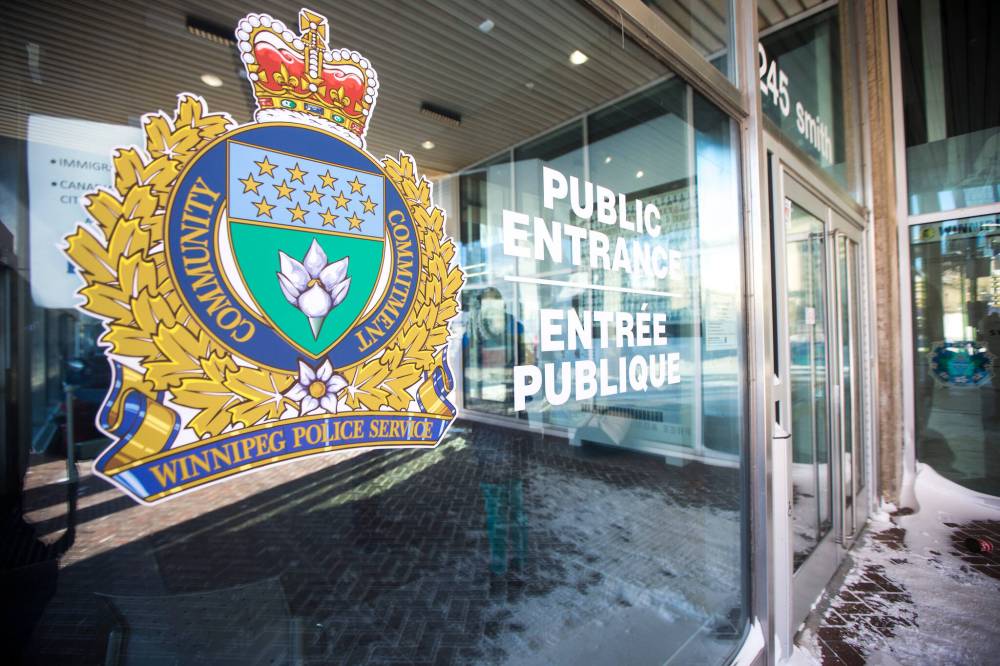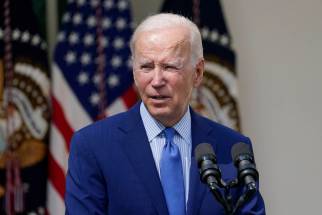Candidates ignore police salaries at taxpayers’ peril
Read this article for free:
or
Already have an account? Log in here »
To continue reading, please subscribe:
Monthly Digital Subscription
$0 for the first 4 weeks*
- Enjoy unlimited reading on winnipegfreepress.com
- Read the E-Edition, our digital replica newspaper
- Access News Break, our award-winning app
- Play interactive puzzles
*No charge for 4 weeks then price increases to the regular rate of $19.00 plus GST every four weeks. Offer available to new and qualified returning subscribers only. Cancel any time.
Monthly Digital Subscription
$4.75/week*
- Enjoy unlimited reading on winnipegfreepress.com
- Read the E-Edition, our digital replica newspaper
- Access News Break, our award-winning app
- Play interactive puzzles
*Billed as $19 plus GST every four weeks. Cancel any time.
To continue reading, please subscribe:
Add Free Press access to your Brandon Sun subscription for only an additional
$1 for the first 4 weeks*
*Your next subscription payment will increase by $1.00 and you will be charged $16.99 plus GST for four weeks. After four weeks, your payment will increase to $23.99 plus GST every four weeks.
Read unlimited articles for free today:
or
Already have an account? Log in here »
Hey there, time traveller!
This article was published 13/10/2022 (1151 days ago), so information in it may no longer be current.
There’s an elephant in the room in Winnipeg’s civic election campaign that candidates are not talking about: how the city plans to pay for ballooning police salaries under a new collective agreement expected in the coming months.
It could be one of the biggest financial challenges the next mayor and city council face after the Oct. 26 election.
The police’s collective agreement expired Dec. 31, 2021. The Winnipeg Police Association and the city are still in contract talks. With inflation at levels not seen in more than 40 years, the union will almost certainly ask for annual wage hikes well above what its members got in the last contract (about 2.5 per cent a year). If the union doesn’t get what it wants through negotiations, it may try its luck in binding arbitration, which is required if a negotiated settlement can’t be reached.
Either way, taxpayers could be facing a massive increase in policing costs. It’s something candidates should be talking about.
Taxpayers could be facing a massive increase in policing costs. It’s something candidates should be talking about.
Police officers are well paid. Winnipeg constables earn annual salaries of $106,609 after five years on the job, not including overtime. That jumps to $120,570 after 15 years, under the WPA collective agreement. The top salary for a patrol sergeant is $129,339 and $146,877 for a staff sergeant.
With more than 1,300 cops on the job, and more than 600 civilian staff and cadets on the payroll, it adds up to about 88 per cent of the $321 million the police service spent last year.
It’s no small chunk of change, considering the police budget now takes up 27 per cent of the city’s total operating budget. In 2005, police spending represented 19 per cent of the city budget. It’s crowding out other civic services.
There has been some progress to curb police spending in recent years. The four-year contract prior to the last one had annual salaries rise on average 3.25 per cent, well above Manitoba’s inflation rate of 1.7 per cent at the time. The last five-year deal was more in line with inflation. Also, steps were taken in the last collective agreement to civilianize some police positions (about 30) and transfer more police duties to lower-paid cadets. It helped save money.
MIKAELA MACKENZIE / FREE PRESS FILES The per capita cost of policing in Winnipeg has jumped eight per cent since 2016 to $418 from $387.
Even with those measures, the per capita cost of policing in Winnipeg has jumped eight per cent since 2016, to $418 from $387. It could get worse. With the consumer price index hovering at eight per cent in Manitoba, it’s unlikely the police union would agree to a wage settlement similar to the last contract. If it goes to arbitration, the outcome is more likely to favour the union than the employer. If that happens, the city could be in for a hefty policing bill.
If, for example, police are awarded annual salary increases of four per cent, it would add roughly $11 million a year to the police budget, not including overtime and pension contributions. That’s equivalent to about a two per cent property tax hike per year. It doesn’t leave much on the table for other important services, including more resources to fight poverty, homelessness and addictions, widely regarded as the root causes of crime.
Trouble is, city council doesn’t have the authority to micromanage police budgets. The Winnipeg Police Board has some influence, but it’s limited (it hires the police chief and “allocates” funding to the police service). However, city council does have the legislative power to determine the police service’s overall budget.
If council is faced with a massive, proposed increase in police spending, it has the authority to reject it and replace it with a lower amount.
If council is faced with a massive, proposed increase in police spending, it has the authority to reject it and replace it with a lower amount. It would force police brass to make cuts, which would likely include a reduction to the police complement. That may be problematic, given the sharp rise in calls for service and the need for more police to investigate the recent spike in serious crimes, including homicides.
Winnipeg is already making do with fewer cops than it did five years ago. The per capita police complement has dropped 10 per cent since 2016. However, pushing back on a ballooning police budget may be the only recourse city council has if the police union insists on significantly higher wages.
It’s something candidates in this civic election should take a position on.
tom.brodbeck@freepress.mb.ca

Tom has been covering Manitoba politics since the early 1990s and joined the Winnipeg Free Press news team in 2019.
Our newsroom depends on a growing audience of readers to power our journalism. If you are not a paid reader, please consider becoming a subscriber.
Our newsroom depends on its audience of readers to power our journalism. Thank you for your support.








